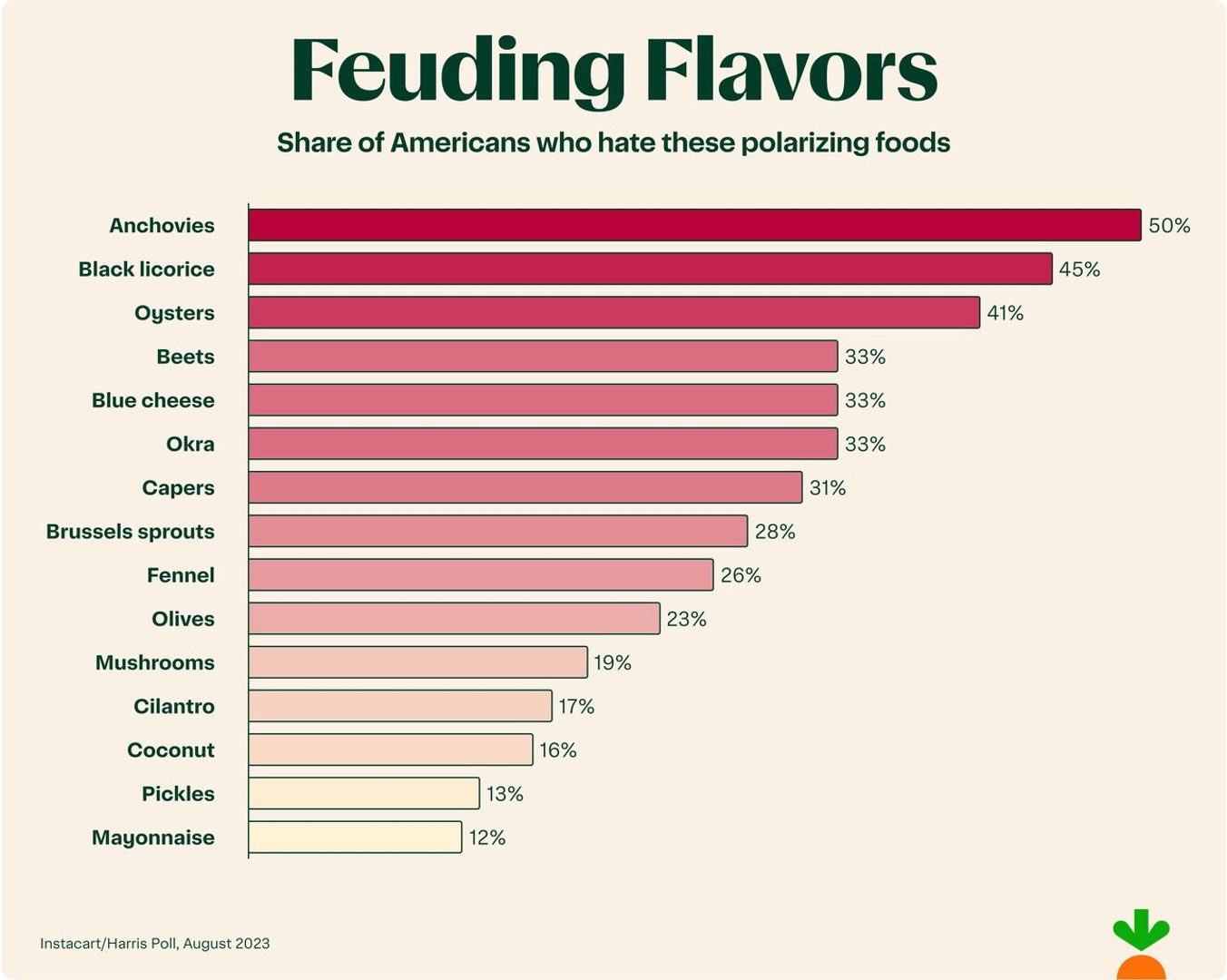Weekly Data
WHAT THE DATA SAY: Anchovies, black licorice, oysters top list of foods America loves to hate
By: Ray Day
CONTACT:
We wanted to share our latest consumer and business insights, based on research from Stagwell. Among the highlights of our weekly consumer sentiment tracking (fielded Aug. 25-27):
WEEKLY WORRIES ABOUT ECONOMY EDGE BACK UP
Today, 87% of Americans are concerned about the economy and inflation – up 2 points from last week and higher than December’s 82% rate.
- 80% worry about a potential U.S. recession (up 1 point)
- 75% about affording living expenses (up 4 points)
- 75% about political divisiveness (no change)
- 81% about U.S. crime rates (down 1 point)
- 68% about the War on Ukraine (up 3 points)
- 58% about a new COVID-19 variant (down 1 point)
- 57% about losing their jobs (up 3 points)
ANCHOVIES, BLACK LICORICE, OYSTERS TOP FOODS WE LOVE TO HATE
The list of foods Americans love to hate is out, and anchovies, black licorice and oysters are at the top, according to our Harris Poll survey with Instacart.
- 50% of Americans dislike anchovies – 56% for those 45 and older and 43% for those ages 18 to 44.
- Women (58%) hate anchovies the most, topping men at 43%.
- Following anchovies, 45% of Americans dislike black licorice.
- Black licorice is most disliked by young people (48% among those 18 to 54 versus 37% for those ages 65 and older) and women (54% versus 35% for men).
- Rounding out the top 10: beets, blue cheese, okra, capers, brussels sprouts, fennel and olives.
- The top reasons Americans think a food could be polarizing or controversial include smell (66%), strong flavor (57%), texture (57%), visual appearance (47%), type of flavor, such as sweet, sour, salty (47%) and how it makes you feel after eating it (32%).
- 37% of Americans have food preferences they consider to be polarizing or controversial.
- 69% say they have encountered a food that they initially disliked but eventually grew to enjoy.
- 37% of Americans say they are eager to try new foods that have a polarizing or controversial reputation.
72% SPENDING LESS ON CLOTHING
Clothing sales tend to tick up in the fall, reaching a spending crescendo at the holiday season. This year might be different, based on our Harris Poll survey of American fashion attitudes and plans.
- 72% of Americans who purchase fashion items for themselves said that they have spent less on clothing during the past year.
- 67% identified price as a factor when shopping for clothes, more than quality (62%) and style (55%).
- 9 in 10 Americans set a budget before they go shopping, and 4 in 10 shoppers identify fashion spending as a source of stress.
- Boomers target tangible considerations more than young people: 78% of Boomers identify price as a factor they consider, followed by quality (74%), item style (64%) and convenience (53%) – each at least 10 percentage points higher than other generations.
- Younger Americans and Black Americans bring their values into the shopping equation more than their counterparts. Black Americans are roughly twice as often as White Americans to identify sustainability efforts (24% versus 13%), a brand’s social stands (21% versus 11%) and a brand’s employment standards (19% versus 9%) as key issues when considering a clothing purchase.
- Similarly, Gen Z cares far more about sustainability (22% versus 12% for Boomers), social stands (25% versus 6%) and employment standards (24% versus 5%).
DO YOU KNOW YOUR LDL NUMBER?
Half of heart attack and stroke survivors are unaware of their LDL cholesterol number, and 70% are unaware that it’s “bad cholesterol,” according to our Harris Poll Survey with the American Heart Association.
- 75% of heart attack and stroke survivors report having high cholesterol.
- Yet only 49% recognize the need to prioritize lowering their cholesterol.
- 98% of heart attack and stroke survivors surveyed say they are willing to take a simple blood test if recommended by their health care professional.
- 65% of heart attack and stroke survivors believe high cholesterol poses a moderate to high increased risk for heart attack and stroke.
71% SAY WE NEED MORE BLACK CEOs
Americans believe diversity remains essential to corporate performance, culture, innovation and profitability, according to our Harris Poll study with the Black Economic Alliance.
- 81% agree that corporate America should reflect the diversity of the American population (90% for Black Americans and 84% for Gen Z).
- 78% support businesses taking active steps to ensure companies reflect the diversity of the American population (88% for Black Americans and 83% for Gen Z and Millennials).
- When thinking about the effects of racial diversity on business, Americans overwhelmingly agree there would be positive impacts on the ability to: understand a broader set of customers (87%); innovate (84%); improve profitability (79%); and boost employee retention (79%).
- Americans overestimate the number of Fortune 500 Black CEOs today. On average, Americans think 19% of the 500 largest companies have a Black CEO. The actual representation is 2%.
- When presented with this CEO diversity gap information, 71% say the number of Black CEOs needs to be increased.
ICYMI
In case you missed it, check out some of the thought-leadership and happenings around Stagwell making news:
- Stagwell’s Mark Penn explains why he’s betting on AI, and what brands get wrong about supporting social issues
- More than half of students rank college applications as their most stressful academic experience, survey finds
- Harris Poll: Younger Americans More Likely to Adopt Chiropractic Care
- From Code and Theory: A Guide to Inclusive Language
Related
Articles
In the News, Investments & Financials, Press Releases, Talent & Awards
Jul 08, 2025
Stagwell (STGW) Advances Executive Team with Four Key Appointments

In the News, Press Releases, Thought Leadership
Jun 10, 2025
Stagwell (STGW) Chairman and CEO Mark Penn to Discuss the Irreplaceable Power of Human Creativity on the Main Stage of Cannes Lions

Events, In the News, Press Releases, Talent & Awards
Jun 05, 2025
Code and Theory Named ANA B2B Agency of the Year After Transforming the World’s Leading Brands






